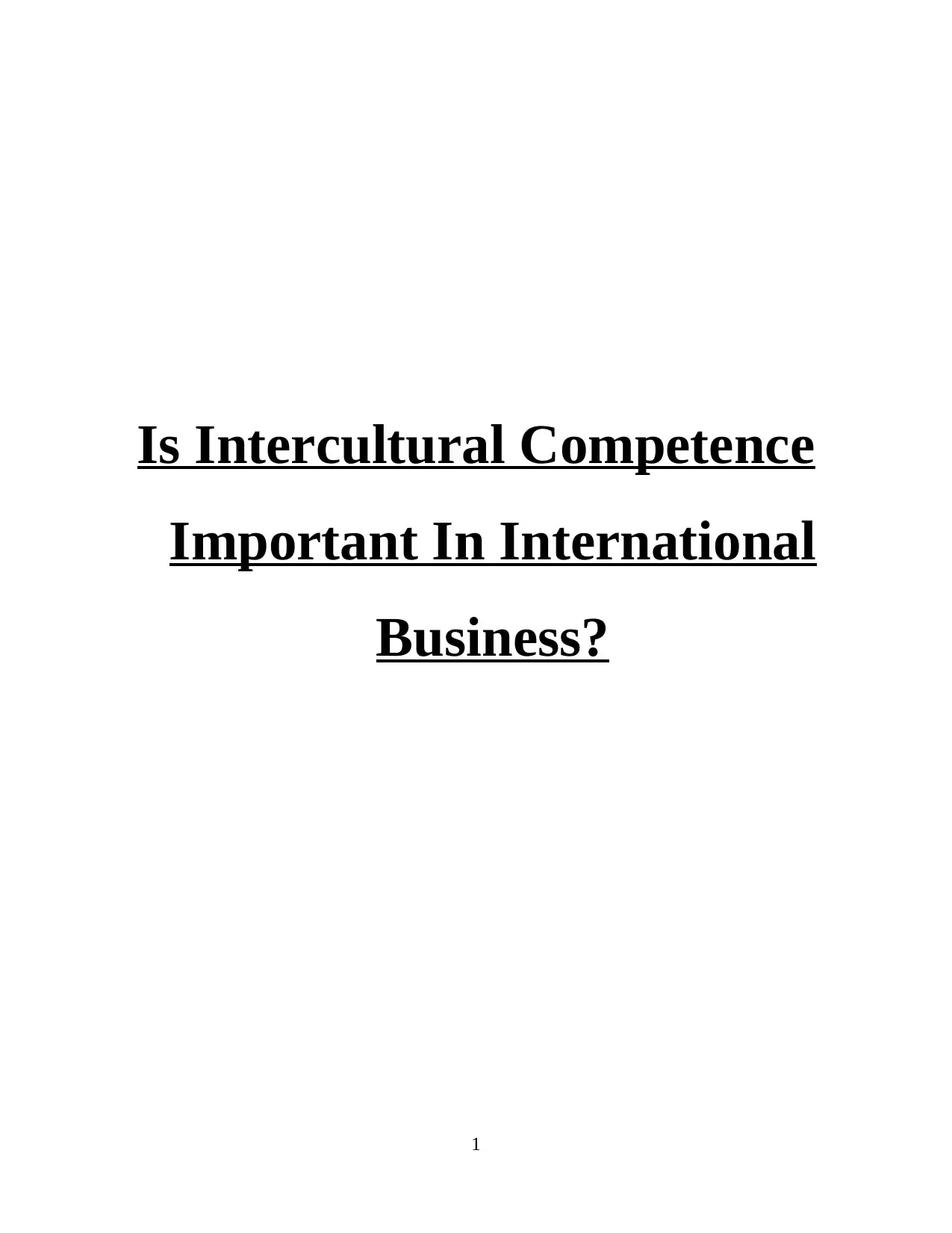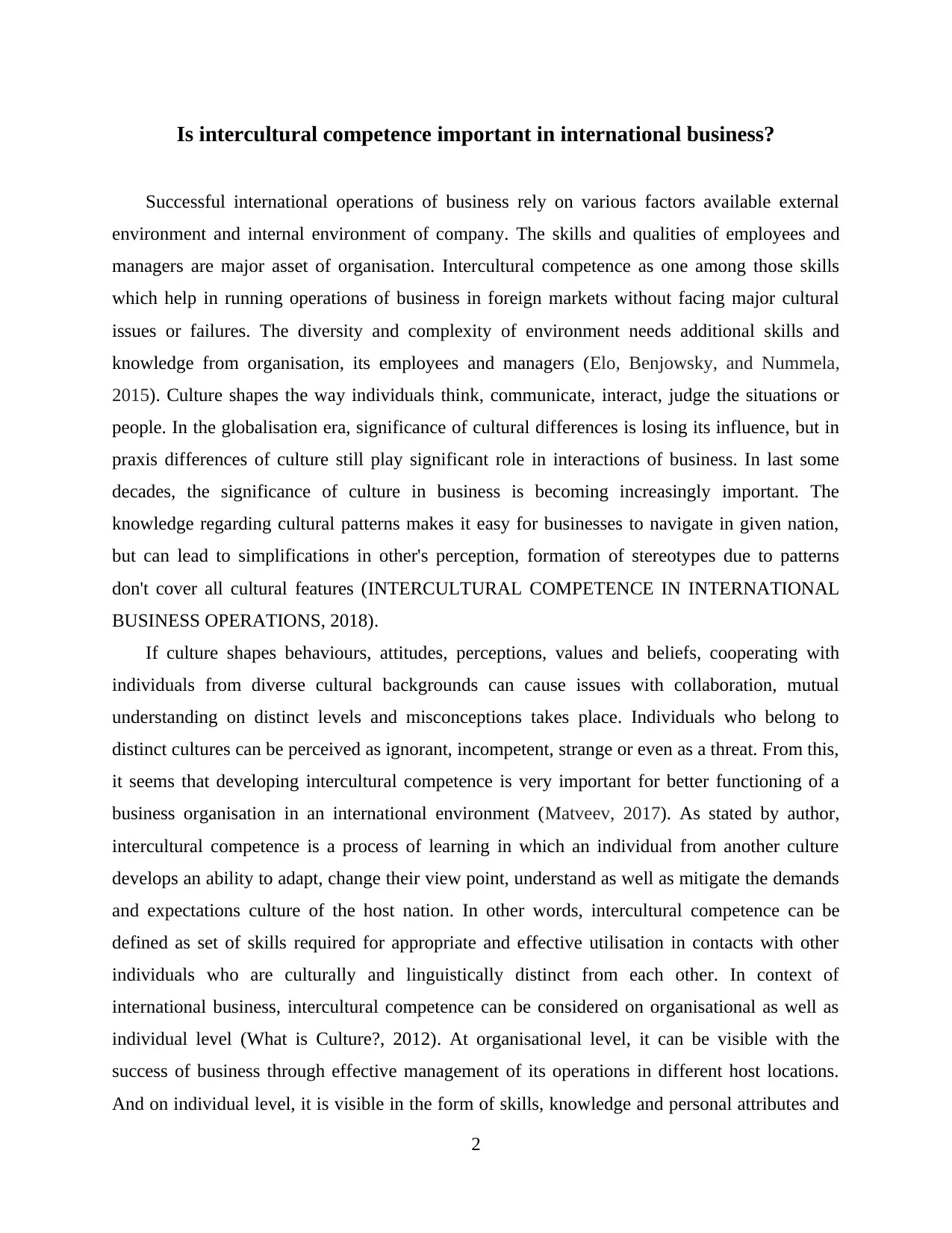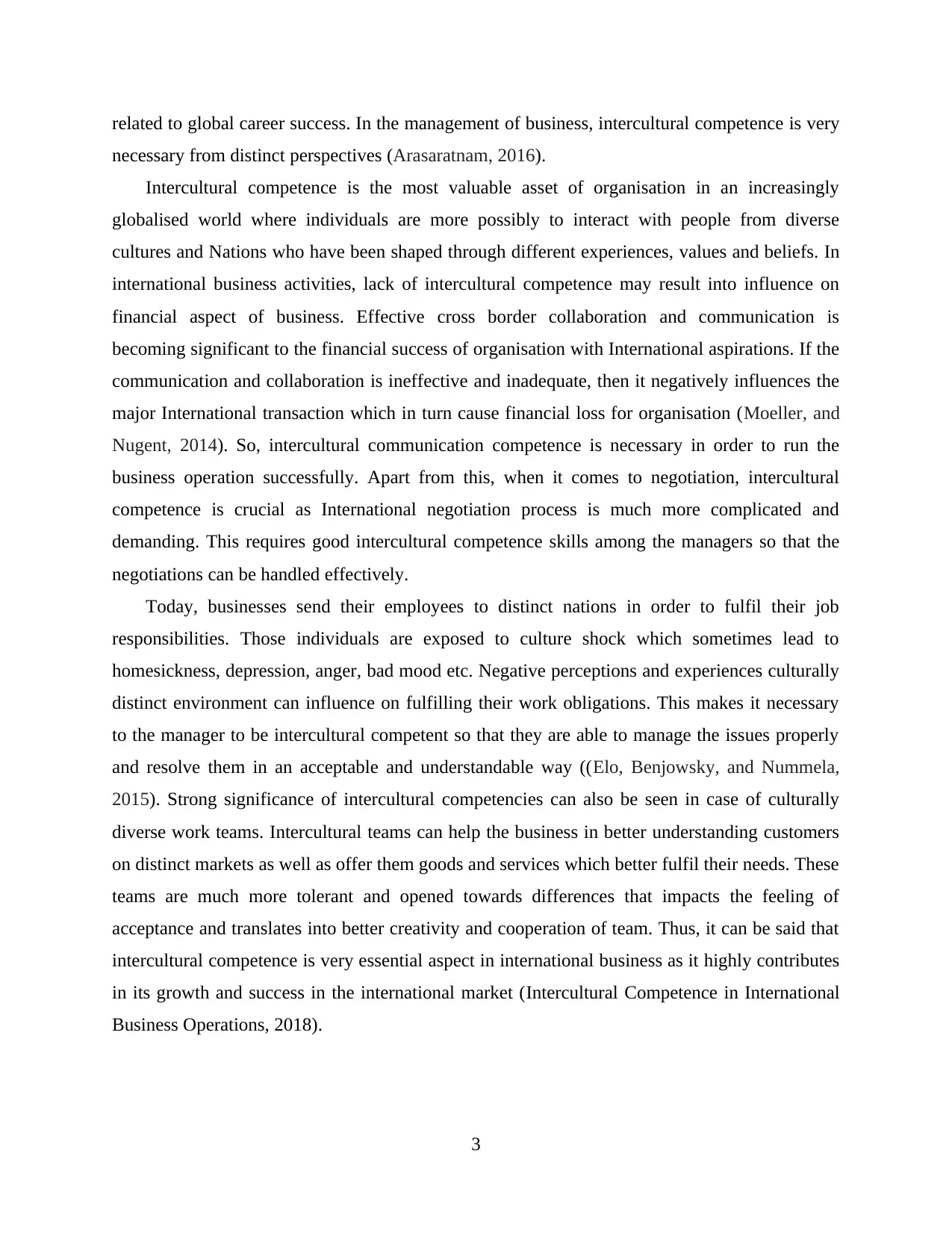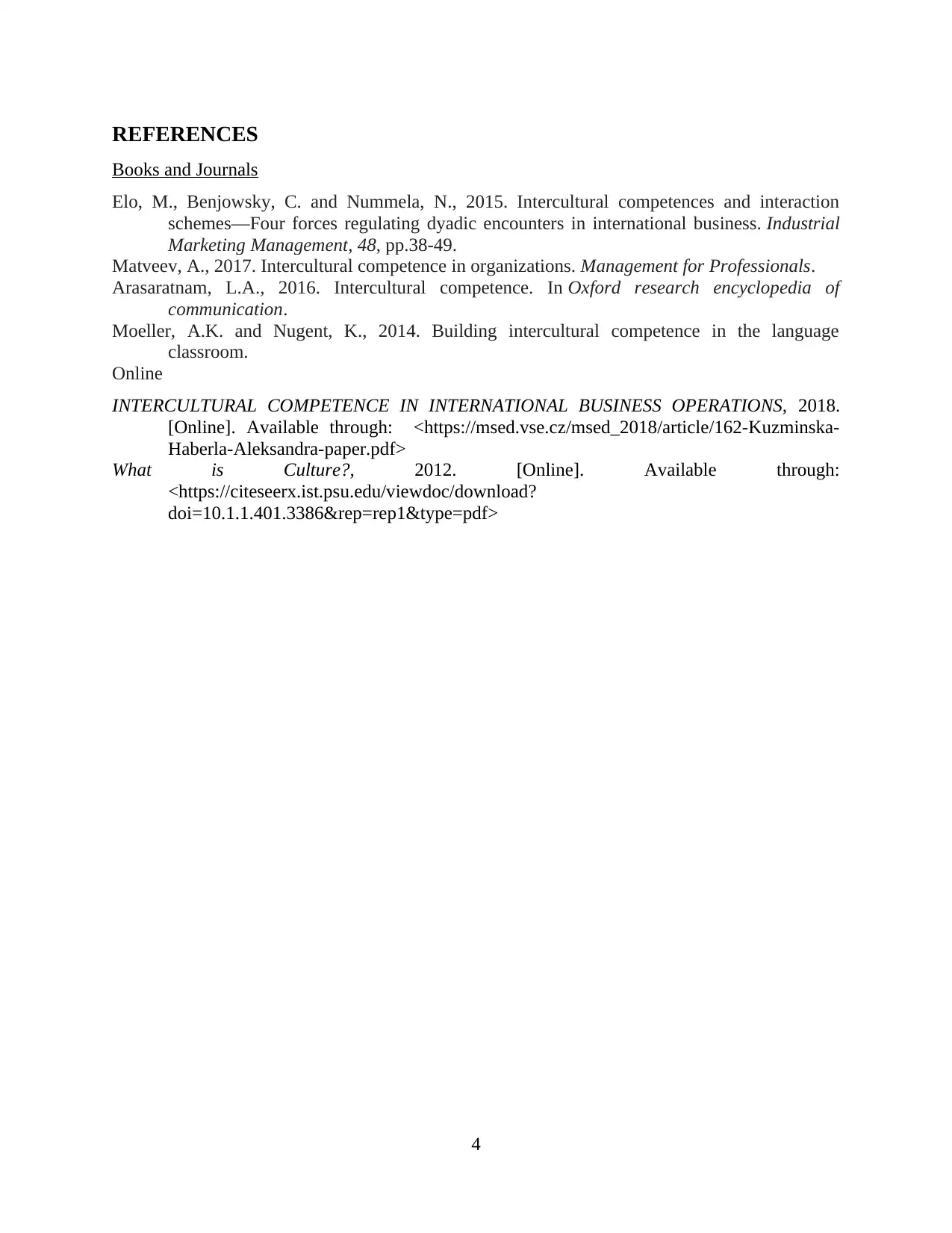Analyzing Intercultural Competence's Impact on International Business
VerifiedAdded on 2023/01/03
|4
|991
|88
Essay
AI Summary
This essay examines the crucial role of intercultural competence in international business operations. It highlights how cultural awareness and understanding are essential for navigating the complexities of a globalized market. The essay emphasizes that intercultural competence is not just a skill but a necessity for effective communication, successful negotiations, and the formation of high-performing international teams. It explores how a lack of intercultural competence can negatively impact financial outcomes, communication, and employee well-being, while a strong understanding of cultural differences can lead to better customer understanding and improved business outcomes. The essay references various sources to support its claims, ultimately concluding that intercultural competence is a key driver of success in the international business arena. The essay also touches upon the impact of culture shock and the importance of managing culturally diverse teams effectively.

Is Intercultural Competence
Important In International
Business?
1
Important In International
Business?
1
Paraphrase This Document
Need a fresh take? Get an instant paraphrase of this document with our AI Paraphraser

Is intercultural competence important in international business?
Successful international operations of business rely on various factors available external
environment and internal environment of company. The skills and qualities of employees and
managers are major asset of organisation. Intercultural competence as one among those skills
which help in running operations of business in foreign markets without facing major cultural
issues or failures. The diversity and complexity of environment needs additional skills and
knowledge from organisation, its employees and managers (Elo, Benjowsky, and Nummela,
2015). Culture shapes the way individuals think, communicate, interact, judge the situations or
people. In the globalisation era, significance of cultural differences is losing its influence, but in
praxis differences of culture still play significant role in interactions of business. In last some
decades, the significance of culture in business is becoming increasingly important. The
knowledge regarding cultural patterns makes it easy for businesses to navigate in given nation,
but can lead to simplifications in other's perception, formation of stereotypes due to patterns
don't cover all cultural features (INTERCULTURAL COMPETENCE IN INTERNATIONAL
BUSINESS OPERATIONS, 2018).
If culture shapes behaviours, attitudes, perceptions, values and beliefs, cooperating with
individuals from diverse cultural backgrounds can cause issues with collaboration, mutual
understanding on distinct levels and misconceptions takes place. Individuals who belong to
distinct cultures can be perceived as ignorant, incompetent, strange or even as a threat. From this,
it seems that developing intercultural competence is very important for better functioning of a
business organisation in an international environment (Matveev, 2017). As stated by author,
intercultural competence is a process of learning in which an individual from another culture
develops an ability to adapt, change their view point, understand as well as mitigate the demands
and expectations culture of the host nation. In other words, intercultural competence can be
defined as set of skills required for appropriate and effective utilisation in contacts with other
individuals who are culturally and linguistically distinct from each other. In context of
international business, intercultural competence can be considered on organisational as well as
individual level (What is Culture?, 2012). At organisational level, it can be visible with the
success of business through effective management of its operations in different host locations.
And on individual level, it is visible in the form of skills, knowledge and personal attributes and
2
Successful international operations of business rely on various factors available external
environment and internal environment of company. The skills and qualities of employees and
managers are major asset of organisation. Intercultural competence as one among those skills
which help in running operations of business in foreign markets without facing major cultural
issues or failures. The diversity and complexity of environment needs additional skills and
knowledge from organisation, its employees and managers (Elo, Benjowsky, and Nummela,
2015). Culture shapes the way individuals think, communicate, interact, judge the situations or
people. In the globalisation era, significance of cultural differences is losing its influence, but in
praxis differences of culture still play significant role in interactions of business. In last some
decades, the significance of culture in business is becoming increasingly important. The
knowledge regarding cultural patterns makes it easy for businesses to navigate in given nation,
but can lead to simplifications in other's perception, formation of stereotypes due to patterns
don't cover all cultural features (INTERCULTURAL COMPETENCE IN INTERNATIONAL
BUSINESS OPERATIONS, 2018).
If culture shapes behaviours, attitudes, perceptions, values and beliefs, cooperating with
individuals from diverse cultural backgrounds can cause issues with collaboration, mutual
understanding on distinct levels and misconceptions takes place. Individuals who belong to
distinct cultures can be perceived as ignorant, incompetent, strange or even as a threat. From this,
it seems that developing intercultural competence is very important for better functioning of a
business organisation in an international environment (Matveev, 2017). As stated by author,
intercultural competence is a process of learning in which an individual from another culture
develops an ability to adapt, change their view point, understand as well as mitigate the demands
and expectations culture of the host nation. In other words, intercultural competence can be
defined as set of skills required for appropriate and effective utilisation in contacts with other
individuals who are culturally and linguistically distinct from each other. In context of
international business, intercultural competence can be considered on organisational as well as
individual level (What is Culture?, 2012). At organisational level, it can be visible with the
success of business through effective management of its operations in different host locations.
And on individual level, it is visible in the form of skills, knowledge and personal attributes and
2

related to global career success. In the management of business, intercultural competence is very
necessary from distinct perspectives (Arasaratnam, 2016).
Intercultural competence is the most valuable asset of organisation in an increasingly
globalised world where individuals are more possibly to interact with people from diverse
cultures and Nations who have been shaped through different experiences, values and beliefs. In
international business activities, lack of intercultural competence may result into influence on
financial aspect of business. Effective cross border collaboration and communication is
becoming significant to the financial success of organisation with International aspirations. If the
communication and collaboration is ineffective and inadequate, then it negatively influences the
major International transaction which in turn cause financial loss for organisation (Moeller, and
Nugent, 2014). So, intercultural communication competence is necessary in order to run the
business operation successfully. Apart from this, when it comes to negotiation, intercultural
competence is crucial as International negotiation process is much more complicated and
demanding. This requires good intercultural competence skills among the managers so that the
negotiations can be handled effectively.
Today, businesses send their employees to distinct nations in order to fulfil their job
responsibilities. Those individuals are exposed to culture shock which sometimes lead to
homesickness, depression, anger, bad mood etc. Negative perceptions and experiences culturally
distinct environment can influence on fulfilling their work obligations. This makes it necessary
to the manager to be intercultural competent so that they are able to manage the issues properly
and resolve them in an acceptable and understandable way ((Elo, Benjowsky, and Nummela,
2015). Strong significance of intercultural competencies can also be seen in case of culturally
diverse work teams. Intercultural teams can help the business in better understanding customers
on distinct markets as well as offer them goods and services which better fulfil their needs. These
teams are much more tolerant and opened towards differences that impacts the feeling of
acceptance and translates into better creativity and cooperation of team. Thus, it can be said that
intercultural competence is very essential aspect in international business as it highly contributes
in its growth and success in the international market (Intercultural Competence in International
Business Operations, 2018).
3
necessary from distinct perspectives (Arasaratnam, 2016).
Intercultural competence is the most valuable asset of organisation in an increasingly
globalised world where individuals are more possibly to interact with people from diverse
cultures and Nations who have been shaped through different experiences, values and beliefs. In
international business activities, lack of intercultural competence may result into influence on
financial aspect of business. Effective cross border collaboration and communication is
becoming significant to the financial success of organisation with International aspirations. If the
communication and collaboration is ineffective and inadequate, then it negatively influences the
major International transaction which in turn cause financial loss for organisation (Moeller, and
Nugent, 2014). So, intercultural communication competence is necessary in order to run the
business operation successfully. Apart from this, when it comes to negotiation, intercultural
competence is crucial as International negotiation process is much more complicated and
demanding. This requires good intercultural competence skills among the managers so that the
negotiations can be handled effectively.
Today, businesses send their employees to distinct nations in order to fulfil their job
responsibilities. Those individuals are exposed to culture shock which sometimes lead to
homesickness, depression, anger, bad mood etc. Negative perceptions and experiences culturally
distinct environment can influence on fulfilling their work obligations. This makes it necessary
to the manager to be intercultural competent so that they are able to manage the issues properly
and resolve them in an acceptable and understandable way ((Elo, Benjowsky, and Nummela,
2015). Strong significance of intercultural competencies can also be seen in case of culturally
diverse work teams. Intercultural teams can help the business in better understanding customers
on distinct markets as well as offer them goods and services which better fulfil their needs. These
teams are much more tolerant and opened towards differences that impacts the feeling of
acceptance and translates into better creativity and cooperation of team. Thus, it can be said that
intercultural competence is very essential aspect in international business as it highly contributes
in its growth and success in the international market (Intercultural Competence in International
Business Operations, 2018).
3
⊘ This is a preview!⊘
Do you want full access?
Subscribe today to unlock all pages.

Trusted by 1+ million students worldwide

REFERENCES
Books and Journals
Elo, M., Benjowsky, C. and Nummela, N., 2015. Intercultural competences and interaction
schemes—Four forces regulating dyadic encounters in international business. Industrial
Marketing Management, 48, pp.38-49.
Matveev, A., 2017. Intercultural competence in organizations. Management for Professionals.
Arasaratnam, L.A., 2016. Intercultural competence. In Oxford research encyclopedia of
communication.
Moeller, A.K. and Nugent, K., 2014. Building intercultural competence in the language
classroom.
Online
INTERCULTURAL COMPETENCE IN INTERNATIONAL BUSINESS OPERATIONS, 2018.
[Online]. Available through: <https://msed.vse.cz/msed_2018/article/162-Kuzminska-
Haberla-Aleksandra-paper.pdf>
What is Culture?, 2012. [Online]. Available through:
<https://citeseerx.ist.psu.edu/viewdoc/download?
doi=10.1.1.401.3386&rep=rep1&type=pdf>
4
Books and Journals
Elo, M., Benjowsky, C. and Nummela, N., 2015. Intercultural competences and interaction
schemes—Four forces regulating dyadic encounters in international business. Industrial
Marketing Management, 48, pp.38-49.
Matveev, A., 2017. Intercultural competence in organizations. Management for Professionals.
Arasaratnam, L.A., 2016. Intercultural competence. In Oxford research encyclopedia of
communication.
Moeller, A.K. and Nugent, K., 2014. Building intercultural competence in the language
classroom.
Online
INTERCULTURAL COMPETENCE IN INTERNATIONAL BUSINESS OPERATIONS, 2018.
[Online]. Available through: <https://msed.vse.cz/msed_2018/article/162-Kuzminska-
Haberla-Aleksandra-paper.pdf>
What is Culture?, 2012. [Online]. Available through:
<https://citeseerx.ist.psu.edu/viewdoc/download?
doi=10.1.1.401.3386&rep=rep1&type=pdf>
4
1 out of 4
Related Documents
Your All-in-One AI-Powered Toolkit for Academic Success.
+13062052269
info@desklib.com
Available 24*7 on WhatsApp / Email
![[object Object]](/_next/static/media/star-bottom.7253800d.svg)
Unlock your academic potential
Copyright © 2020–2026 A2Z Services. All Rights Reserved. Developed and managed by ZUCOL.





